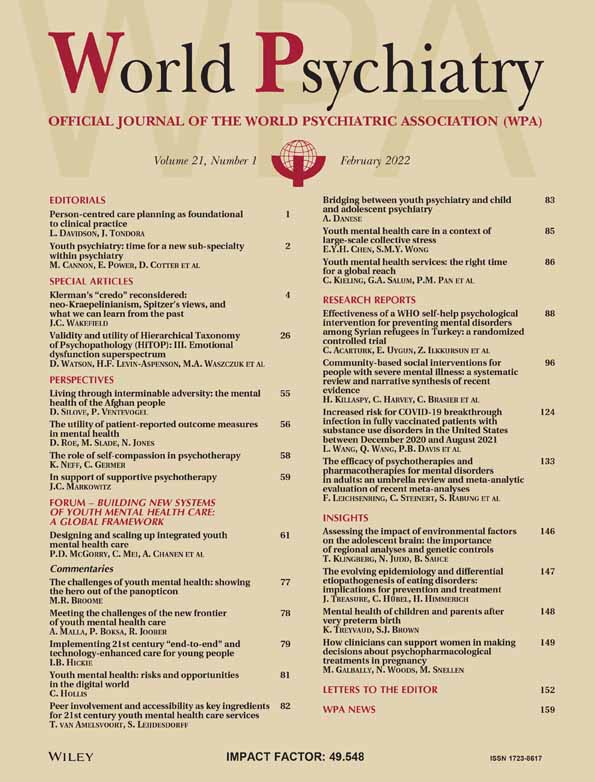WPA Volunteering Programme: a pilot project in Mexico
The WPA has a core mission of enhancing access to quality care in all countries around the world1-3. A key to this achievement is the provision of high-quality psychiatric education to mental health professionals, especially those working for underserved populations.
As part of the WPA Action Plan 2020-2023, a Workgroup on Volunteering has been set up4, whose aim is to provide a platform for the delivery of high-quality psychiatric education through expert volunteering from Member Societies with better training resources to mental health professionals working in countries with relatively constrained training resources.
In view of the potential pitfalls and challenges in organizing and implementing a cross-national volunteering programme, especially in times of travel restrictions due to the COVID-19 pandemic, it was felt necessary to conduct pilot projects (including online volunteering) in designated sites to allow full evaluation and learning by the Workgroup before the full implementation of the programme5.
A pilot project has been completed in April-June 2021. Colleagues in the city of Zapopan, Mexico, working at the San Juan de Dios Hospital, were linked with a training psychotherapist from the Netherlands, J. Van Hoof, who kindly prepared and delivered six modules of modern psychotherapeutic theory and practice in relationship to brain mechanisms.
Organizing the programme followed the process outlined on the WPA Volunteer webpage (https://www.wpanet.org/wg-on-volunteering). Prof. B. Ng, based in the city of Mexicali, worked with colleagues in various Mexican cities to ascertain what would work best, made the appropriate introductions and offered support. The potential sites first considered included Campeche, Monterrey and Zapopan, where the pilot project finally took place.
Ten trainees (40% early career psychiatrists and 60% psychiatry residents; 60% males; mean age 30.1±3.3) were selected on the basis of their interest in the subject covered in the material. Early career psychiatrists had up to 5 years of clinical experience in psychiatry.
Due to COVID-19 pandemic, the focus of the pilot programme was on online volunteering5 and the methodology was interactive online lecturing, with a focus on what participants already knew and what they wanted to learn. So, in order to offer a suitable flexible programme tailored to their ideas, much time was put aside for questions and answers. The trainees participated in choosing the topics of each session.
One-hour sessions were delivered over three months and included the functions and activities of main brain structures, evolutionary psychiatry, attachment, object relations, neurotransmission, depression, trauma theory and therapy, as well as genetics and development.
The anonymous evaluation after the training revealed trainee satisfaction, with high scores for applicability and helpfulness of the knowledge gained in clinical practice (Likert scale score of 4.3±0.8 out of a maximum of 5 points) and overall satisfaction of 4.4±0.5 (out of a maximum of 5 points). There were no technical difficulties, and English was acceptable as the language used (despite both trainer and trainees having another first language).
All participants in the pilot project were satisfied with the size of the group during training, and 80% of the trainees were also satisfied with the duration of the training. Only 10% each would have preferred either a longer or a shorter training. Comments included the appreciation of the trainer's kindness and warmth, the human perspective of the course, the opportunity to hear about the experience of a professional from another country, and hearing about new treatments and neurobiological advances. There were several suggestions that sending a bibliography and a schedule ahead of online meetings would be helpful.
Feedback from the trainer was that the training was a most enjoyable experience and that the atmosphere was friendly from the beginning. The participants were motivated as they had already indicated which topics they were interested in. The trainer also stressed that it was important that he could access support at any time directly from the organizers in Mexico.
At the start of the training sessions, the participants and the trainer agreed that they would keep the content of the meetings confidential, in order to give everyone the freedom to communicate freely, especially in case somebody wanted to speak about patient matters.
Notwithstanding the great physical distance between Mexico and the Netherlands, there was a sense of closeness, similarity of experiences, and friendliness. Although the sessions were not videotaped, from anonymous evaluation after the pilot project it emerged that participants would agree that the online training be recorded in the future, so that other people who do not participate in the course can benefit from the recording.
The WPA Continuing Professional Development (CPD) certificate was offered to the attendees, all of whom completed each module of the course.
A second larger pilot exercise focused on child and adolescent mental health is now planned in Pakistan. The WPA Workgroup on Volunteering welcomes proposals from Member Societies for further training projects.




